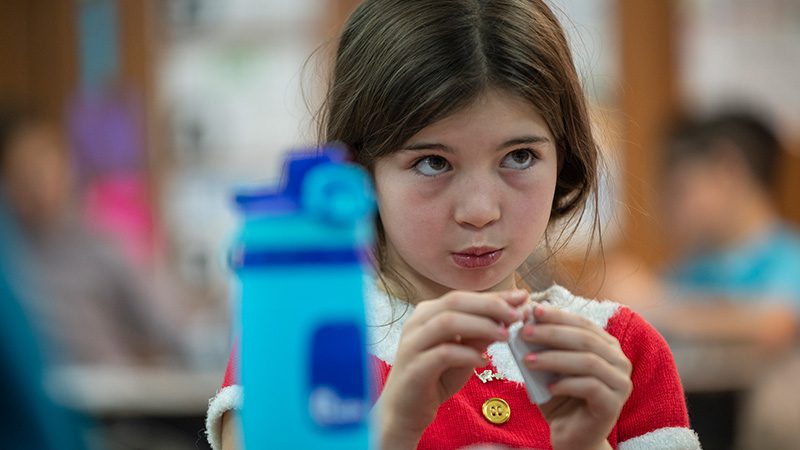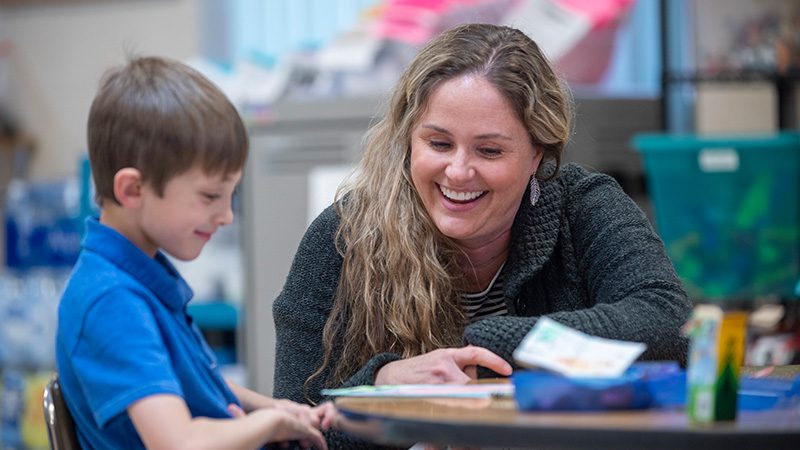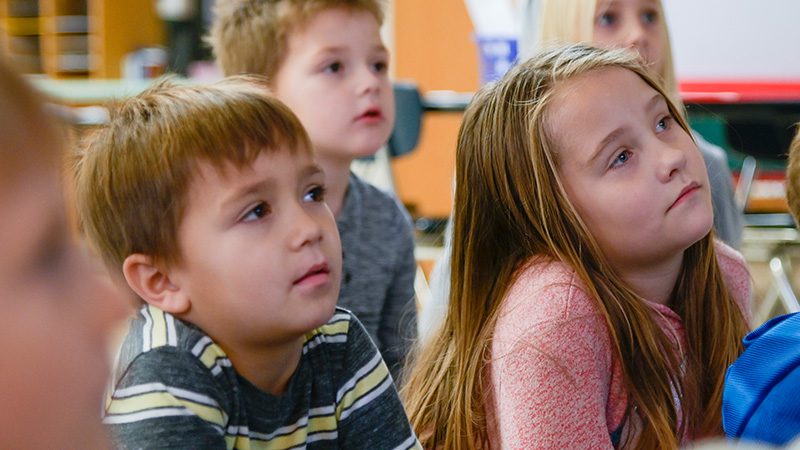Clara Bolen Elementary
Community connection and caring propel learning
By Cassandra Spratling
Six girls and a boy gathered around a table in teacher Janice Tiffany’s colorful classroom, adorned with bright bold letters, numbers and inspirational messages. Each student was given a practice sheet with words listed in two columns. Their assignment: draw a line connecting a word from one column to a rhyming word on the other column.
“What sound stays the same, the beginning or the end?” the teacher asked.
“The ending sound stays the same,” a few students responded. “Very good,” the teacher said. Then together they did the first rhyming word, connecting ‘stand’ to ‘bland.’ Before moving on the teacher made sure they understood the meaning of ‘bland.’ “If food is not spicy or flavorful, it is bland,” she said. Afterward students were asked to complete the sheet individually.
“I messed up,” one student said, clearly feeling dejected after completing her sheet.
“No, you made a mistake on one. But the rest are correct. Let’s figure out why one is wrong, and then it’ll be perfect,” Tiffany said using a tone that encouraged rather than discouraged.
Pulling students who need extra help into small group settings to work on specific lessons so each child gets more individualized instruction is one of several strategies used to help students succeed at Bolen Elementary School, a modern brick building in the town of Tawas, MI., located along the shores of Lake Huron.
While the rural town may be known to most as a popular tourist attraction because of its small-town charm and pristine water views, the elementary school that serves 434 kindergarten through fourth grade students warrants its own attention, suggests research and interviews with staff and others associated with the school. More than 60 percent of its students come from economically disadvantaged households, yet the proficiency rates in math and reading for these students at Bolen surpassed statewide rates from 2017 to 2019, according to analyses by The Education Trust-Midwest. Regular assessments followed by targeted instruction, both in the classroom and in small groups as was demonstrated by Title I teacher Tiffany Justice, is a big part of what’s working there.
But that’s only part of the story, says former principal Sarah Danek, who in July took the helm of the upper school, a sprawling campus serving grades 5-12 located less than a mile away.
“It isn’t just one strategy or one thing…it’s that umbrella or that fully-encompassed piece that ties everything together,” says Danek, who also doubles as the soccer coach and along with her husband, David, also coaches hockey.
Other pieces of the puzzle include parent and community support driven by its small-town closeness, regular assessments that guide instruction aimed at helping all students do well, and a team approach to teaching buttressed by professional development that keeps instructional staff on top of their game. The first step, though, is striving to make all students feel valued and cared for.
It starts with the heart
“Clara Bolen, it’s extremely welcoming to all students,” says third grade teacher Kelli Rau. “We focus more on building as a family, and that carries out through my classroom and into the entire school.”
Receiving special services is not a stigma because everyone receives special attention. All students receive free breakfast and lunch. Each student has a Chromebook at school and at home—which is especially important since many students come from low-income homes where a computer for every child could be considered a luxury. All students—based on assessments—are pulled out or grouped into small groups for instruction daily either with their own teacher or Tiffany Justice, the Title 1 instructor, a position funded with federal money to assist students from low-income homes.
“Nobody sees that as like a negative,” Rau says. “They love going with our Title support teacher and (para professionals). They love the one-on-one and…that I can then do small groups while they’re pulled and give everybody the attention they need.” Those strategies are really positives for the students, she said.
Teachers then use the ongoing student assessments to tailor their instruction to student needs, whether it’s providing more focused guidance in the classroom or pulling the students into small groups for more intimate instruction.
Clara Bolen, it’s extremely welcoming to all students. We focus more on building as a family, and that carries out through my classroom and into the entire school.”
Third Grade Teacher

Community Support: part of the fabric of the school
“We’re very lucky to have a very close-knit community that very much supports the school and our initiatives,” Danek said. “We don’t have to ask too far out for any support without having a quick response.”
Hundreds of residents show up for events, whether academic or athletic. And local businesses and area charities regularly provide food or other gifts to the school and its students. Danek herself has two children in the district, a kindergartener and a third grader.
“We have charitable organizations from all over our county that adopt families for Christmas, provide Thanksgiving meals to families and more,” Danek said. “Coats for Kids is another support and they join us at EVERY parent/teacher conference K-12 to provide families with new coats for the winter season, hats, gloves, and boots. Leading up to spring break, our community participates in PB&J drives to ensure the families have enough food for lunches while the students are home for break. Every time we ask we end up with more than needed! It is truly a blessing to live in the small-knit community where everyone looks out for each other.”
It helps that the community is so small; people know each other. It’s not unusual to run into each other at the grocery store. School staff members often were classmates of parents.
“Family and community involvement is huge,” Danek says. “If kids see their parents care, they’re going to care.”
“We’ve grown up together, and now our kids are growing up together,” says Bolen parent Darion Briggs who’s also a para-pro there. Her experience at Bolen has inspired her to seek a teaching degree.
The close-knit connections between school staff and the families they serve make it easier to communicate about students’ progress. Parents often know the families so they’re not communicating with strangers. Parents know the teachers and feel they care.
It Takes A Team
To ensure every student succeeds, teachers collaborate both formally and informally. On a formal basis, they meet daily to go over curriculum, address any concerns, review assessments and plan actions based on data from those assessments. “Collaboration is definitely key. Our grade levels have 52 minutes of common planning time EVERY day,” Danek says.
The team approach extends beyond academics. For example, as the end of the 2022 school year approached, kindergarten teacher Krista Loeffler noticed several of her students were particularly antsy. In talking with a few parents, she learned students were feeling fearful of leaving her and going into first grade.
She and first grade teacher Amy Short decided to bring the two groups together for a learn and play date. The kindergarteners learned things that quelled their concern, such as: you will make new friends, the new teachers are nice just like the kindergarten teacher and you’ll learn a lot—even how to tell time. After the discussion time, the kindergarteners and first graders partnered up and read stories to each other. One kindergartener summed up what he’d learned from spending part of the morning together. “It’s OK to go to first grade,” he said. “It’s just as good or better (than kindergarten)”


Educating Beyond the Pandemic
The pandemic interrupted learning at Bolen just like everywhere else. One teacher noted, for example, that while parents were adept at helping students learn basic arithmetic, keeping them on top of reading fluency skills presented more of a challenge. Principal Danek noted that many students began kindergarten without gaining the usual socialization skills learned through pre-school experiences.
Again, Bolen’s consistency with assessments and small-group instruction helped them pinpoint gaps and strengthen specific skills. Students who needed or desired extra help were also encouraged to attend summer instruction.
And, Bolen’s staff includes a school success liaison, Joy Garrison, who helped parents navigate challenges presented by the pandemic, such as reduced finances, unemployment and assistance with basic needs, such as food and housing.
“She has done so much to help with any barriers to education and identifying gaps,” Principal Danek says. “Our biggest problem, I think, that COVID and the pandemic has caused, is school readiness, or the level of school readiness, or the lack thereof. More than ever before, we have students who don’t have a preschool experience that they’re coming to school with. And so, it’s teaching just the simple dynamics of being ready for school and lining up and sharing and being respectful and having empathy, and all of the basics that they would normally come to us with.”
The pandemic took a huge financial toll on Tawas families as many either lost jobs or chose to stay home to care for family members with health concerns, Danek says.
“Joy does everything to mitigate that, from counseling families that might be going through divorce or helping with transportation or helping with attention spans in classrooms … and finding resources to keep the gas and the heat running during the winter months. And everything that you can think of, she has a resource for, and she’s just a very valuable tool.” In a school where so many students come from low-income backgrounds, that’s especially important, and is part of the reason why Bolen is so successful with meeting students’ needs and helping them achieve success.
“It’s been a blessing to have her. I don’t know what we would do without that, because she has a formal caseload, obviously, of students; but her informal caseload is, I would say about 80% of the students this year probably met with her on some capacity, just for extra support.”
Most importantly, Danek says, Bolen’s entire staff helped its students by demonstrating that school is a safe, positive, and caring place “and that we’re here to support you in no matter what you’re struggling with at home.”
Danek reflected on the name of the district’s mascot: The Braves. “It is definitely something in honor of the Native American heritage in our area, and is to inspire bravery. The tribe approved of us keeping the name because of the positivity it portrays.”